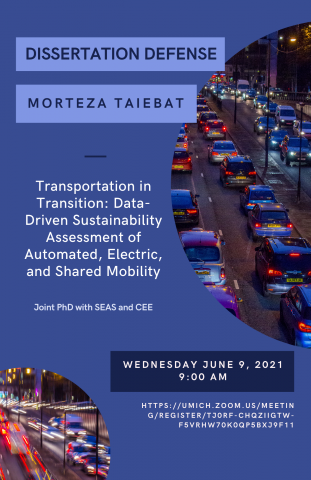Doctoral Dissertation: Transportation in Transition -- Data-Driven Sustainability Assessment of Automated, Electric and Shared Mobility
Abstract:

Emerging technologies in transportation, including vehicle automation, electrification, and shared mobility, are poised to transform the mobility paradigm, transportation markets, and travelers’ behavior in the coming decades. While improvement in safety, mobility, and energy efficiency will yield large benefits to the society, the sustainability outcomes and the net effect of these technologies on energy usage and the environment are unclear. With the transition still in its infancy, there is an opportunity to work proactively to ensure that these emerging technologies develop sustainably. This research broadly focuses on leveraging the synergies of these emerging technologies to improve transportation system efficiency, sustainability, and social equity. It is intended to shed light on how they impact travel pattern, energy use, and economics of mobility.
This dissertation begins by examining the interactions between connected and automated vehicle (CAV) technology and the environment. Net positive environmental impacts are expected at the vehicle, transportation system, and urban system levels, but a greater vehicle utilization and shifts in travel patterns could cause an energy “rebound effect.” Using an econometric model of vehicle miles traveled (VMT) choice under income and time constraints; I estimate elasticities of VMT demand with respect to fuel and time costs. The estimated elasticities are then used to simulate VMT and energy use impacts of full, private CAV adoption under a range of possible changes to the fuel and time costs of travel. I forecast a 2-47% increase in travel demand for an average household. This presents a stiff challenge to policy goals for reductions in not only energy use but also traffic congestion and local and global air pollution, as CAV use increases.
Next, I investigate the nexus of electrification and shared mobility by determining range suitability and cost competitiveness of battery electric vehicles (BEVs) for ride-hailing drivers using the 2019 driving data on the Lyft platform. I estimate that, for more than 86% of drivers, their daily travel needs can be met by a fully charged BEV with listed range of 250 miles on at least 95% of days. The results suggest that range and lifetime cost should not be significant barriers to widespread BEV take-up in the ride-hailing business. Machine learning techniques are utilized to understand the sharing behavior in ride-hailing trips, using a novel dataset from all ride-hailing trips in Chicago in 2019. I find that the travel impedance variables (trip cost, distance, and duration) collectively contribute to 95% and 91% of the predictive power in determining whether a trip is requested to share and whether it is successfully shared, respectively. This implies that pricing signals are more effective to encourage riders to share their rides. Building on these findings, I provide empirical evidence on the short-run effects of incentives for shared travel in ride-hailing. Using data on all ride-hailing trips in Chicago for eight months from 2019-2020, the effect of a new congestion fee policy change on ridership is estimated. I show that a $1.15 rise in the relative price of a private ride is associated with a 2.4 percent rise in willingness to share. I find no evidence of a drop in TNC person-trips overall, which implies that the policy effect is mainly to induce substitution from private to shared rides. The insights from this research can provide guidance to steer the development of these emerging technologies towards desired societal and environmental outcomes and inform short- and long-term policymaking for their sustainable adoption.
Bio:

Morteza Taiebat is a joint Ph.D. candidate in Resource Policy and Behavior (SEAS) and Transportation Engineering (CEE) at the University of Michigan. He is affiliated with the Center for Sustainable Systems, working under the supervision of Ming Xu, Sam Stolper, and Henry Liu. His research broadly focuses on leveraging the emerging modes of transportation (i.e. automated, shared, & electric vehicles) to improve transportation system efficiency while reducing social inequality and environmental impacts. He utilizes data science techniques, economics, and optimization to investigate the mechanisms that promote sustainable transportation.
REGISTER TO JOIN THE ZOOM PRESENTATION:
https://umich.zoom.us/meeting/register/tJ0rf-ChqzIiGtW-f5VrhW70k0QP5bxj9f11